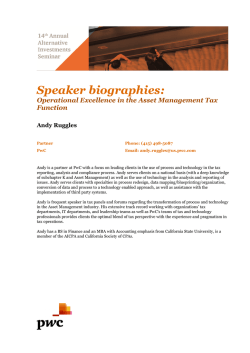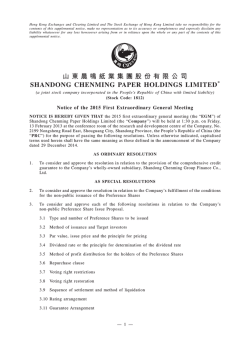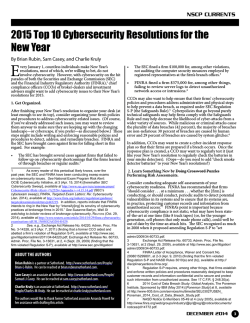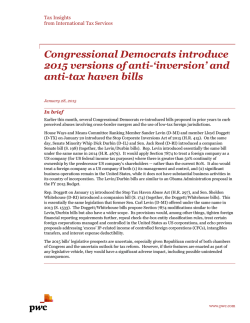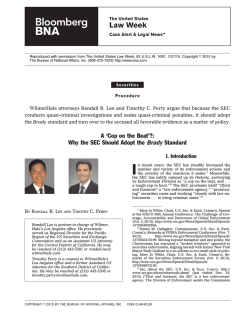
BoardroomDirect
BoardroomDirect The monthly newsletter for PwC's Center for Board Governance – January 2015 Inside this edition (January 30, 2015) Issue in focus Key considerations for board and audit committee members, 20142015 edition: Is your boardroom agenda meeting today’s needs? Issues in brief What President Obama’s State of the Union speech could mean to companies Chair White asks SEC staff to review shareholder proposals exclusion rule US Chamber of Commerce expounds on SEC proxy advisory firm guidance Delaware Supreme Court affirms exclusive forum in recent case Political lobbying disclosure shareholder proposal cleared for ballot Audit committee issues Worth reading Leading in extraordinary times: 2015 PwC CEO Survey CEOs everywhere are forging ahead in an environment they believe is more volatile and unpredictable. That is just one of many observations in this year’s survey. Also, read a related essay about the survey. Proxy season: Looking back, looking forward Catherine Bromilow, a partner in PwC’s Center for Board Governance, discusses what shareholders are pursuing in a preview of the 2015 proxy season. -NYSE Governance Services Center for Board Governance webcast SEC adopts swap data repository, security-based swap rules New report focuses on building a fraud-resistant organization NACD BoardVision In a February 19 webcast, Mary Ann Cloyd, Leader of PwC’s Center for Board Governance; Mike Gallagher Managing Partner of Assurance Quality, PwC; and Wayne Carnall, Partner, SEC Services, PwC and former Chief Accountant of the SEC’s Division of Corporate Finance; will discuss the SEC’s active agenda, the current enforcement environment, and leading practices when responding to investigations, FASB’s standardsetting activities, and the PCAOB’s key priorities. To register for the webcast, click here. Resources, webcasts, and events In this episode of BoardVision following a session at the NACD Board Leadership Conference, Henry Stoever, Chief Marketing Officer at NACD and Mary Ann Cloyd, Leader of PwC’s Center for Board Governance discuss the latest NACD Blue Ribbon Commission Report on the board's role in strategy. To view the video, click here. See the latest thought leadership from PwC’s Center for Board Governance. Click here. Contact us For more information about this newsletter, contact Gary Larkin. 1 Issue in focus Key considerations for board and audit committee members: Is your boardroom agenda meeting today’s needs? Back to top The changing business landscape, technological advances, and significant risks such as cybersecurity continue to present opportunities and challenges for companies today. Directors will want to take a fresh and critical look at their boardroom agenda to ensure it is meeting today’s needs. PwC’s 2014-2015 edition of Key considerations for board and audit committee members, an annual publication from PwC’s Center for Board Governance, can help enhance the quality of board and management discussions in the coming year. Here are some highlights: Shareholder activism: Preparing for potential interaction The number of shareholder activists is growing, and their assets are, too. Nearly one in five S&P 500 companies were targets of shareholder activism in 2014. 1 Activist hedge funds often target companies they believe are mismanaged or underperforming, while others go after companies with a lot of cash on hand. What can companies do? Some companies have found it beneficial to look at the company through the activists’ eyes, proactively identifying and addressing areas such as undervalued assets and cost-cutting measures, which can be common targets. Director considerations: • • • Think about what activists commonly look for, and consider whether the company may be a target of an activist campaign. Discuss with management whether to evaluate how the company might be viewed through activists’ eyes. Discuss with management the company’s crisis response plan, if needed, in the event of an activist campaign. Emerging technologies: Considering their strategic impact Companies recognize that they have to keep up with the rapid pace of technological change and stay focused on innovation in order to stay competitive. Big Data, mobile computing, the cloud, and social media are examples of emerging technologies that are reshaping business. What are companies doing with these technologies? • 1 Big Data – Many companies are mining the massive amounts of data they collect and data provided by third parties to make predictions about customer behavior. Brendan Sheehan, “Trends in Shareholder Activism,” Global Governance Advisors, October 2014. 2 • • • Mobile computing – Some companies are investing more in mobile advertising, while others are considering creating branded mobile apps. Cloud computing –Some companies are adopting cloud computing technologies to allow for more agility, scalability, and efficiency, along with cost reduction. They are starting to move to the cloud to manage human resources, financial information, procurement, and supply chain services, among other activities. Social media – More companies are using social media to increase brand loyalty and improve their customer experience. Director considerations: • • Discuss with management how the company is keeping up with technological change and the activities of its known competitors and potential disruptors. Understand how the company is using emerging technologies to drive growth and how the related risks are managed. Risk oversight: Focusing on risk appetite and third-party risks Boards should continue to focus on overseeing the company's most critical risks and agree on the company’s overall risk appetite. They should also recognize the risks that come with the use of third parties. Risk appetite is the amount of risk an organization is willing to accept in pursuit of strategic objectives. It’s a process that, when properly defined and communicated, drives behavior by setting the boundaries for running the business and capitalizing on opportunities. Companies frequently use third parties, and this can expose companies to risks—with significant bottom line and reputational repercussions. Companies need to have appropriate risk management practices that address third-party risk, including conducting appropriate due diligence. Director considerations: • • Discuss management’s assessment of the company’s risk appetite and consider whether it should be adjusted as strategic goals and objectives change. Discuss with management the company’s third party relationships and how it manages, and monitors the related risks. Cybersecurity: Overseeing the risk Cybersecurity is more than a technology issue. It is a business issue and broader riskmanagement issue. Companies today are interconnected with their customers, vendors, distributors, suppliers, partners, advisors, and many others. These parties have various access points to a company, which can create greater exposure to a cyberattack. Companies today are often managing larger, more complex digital environments without bigger IT budgets. Delays to software upgrades or the replacement of legacy IT infrastructure -“enterprise technical debt” – can create greater risk exposure to cyberattacks and ballooning costs over time. 3 The Cybersecurity Framework, which the Commerce Department’s National Institute of Standards and Technology (NIST) released in February 2014, can be a resource for companies. The Framework is a risk-based compilation of guidelines designed to help companies assess their current capabilities and draft a roadmap toward improved cybersecurity practices. Director considerations: • • • Actively engage in the discussions around the company’s cybersecurity program and whether it protects the company’s most valuable assets across the business enterprise and is getting the appropriate level of attention, resources, and leadership. Discuss the IT budget with management, including the IT security budget, and understand the company’s enterprise technical debt, if any. Ask about the NIST Framework and whether management has considered the guidelines in developing its cybersecurity program. Crisis management: Understanding the response plan Companies may face crises ranging from a cyberbreach to a natural disaster or even a sudden change in leadership, so they will want to have a crisis response plan. It’s important to test that plan to improve the likelihood of effective execution. Some companies do so by conducting tabletop exercises to examine specific scenarios and pressure-test incident response plans. Crisis response plans should be updated. Recent crises can provide some lessons to consider: It’s important to have the right crisis response team in place, and it’s also important to control the message from the beginning. Director considerations: • • Ask if management has performed periodic scenario testing of the company’s crisis management plan to reduce the likelihood of mistakes and inefficiencies. Consider lessons learned from recent crises and discuss with management whether any actions or changes are needed to the company’s crisis response plan. Financial reporting and revenue recognition: Keeping up with standard-setters and regulators The FASB issued a new revenue recognition standard in 2014, which aims to provide a single, comprehensive revenue recognition model for all contracts with customers. It will have varying effects on companies depending on their industry and current accounting practices, but extensive disclosure requirements will impact all companies. The new standard has far-reaching implications and companies will want to start preparing for it now. Directors should also stay up-to-date on any new or proposed accounting standards that could impact the company’s financial reporting and business practices. For example, standards related to discontinued operations and going concern were recently issued by the FASB. 4 Director considerations: • • Discuss with management which customer contracts will be affected by the new revenue recognition standard and how revenue recognition will change for the company. Understand other key financial reporting developments and discuss with management how they might impact the company, as well as how the company is preparing for potential new rules. Noteworthy investor perspectives: Considering their views There are investors of all sizes and types participating in the capital markets today. While they may have different perspectives and investment strategies, most have expectations about board performance. So it’s important to know your shareholder base and consider its views. For example, institutional investors have a keen interest in diversity. More rate gender diversity as “very important” than do directors. And whether to have direct dialogue between boards and investors remains a topic of much discussion. Two-thirds of directors say their board had direct communications with institutional investors in the last 12 months. Institutional investors’ opinions about direct communication with board members vary. Some believe that board interactions should have a purpose—and not just occur for the sake of engagement. Others are considering more robust engagement with boards, including proposing “shareholder liaison committees.” i Director considerations: • • 1 Assess whether the board has the right skills, experience, and diversity for optimal performance and future success. Determine if and when the board should communicate directly with investors and if the company has established communications protocols. Stephen Foley, “Vanguard calls for boardrooms shake-up,” The Financial Times, December 4, 2014. Issues in brief What President Obama’s State of the Union speech could mean to companies Back to top In his sixth State of the Union speech on January 20, President Obama addressed several topics that could potentially affect US companies. He also made it clear to Congress that he would use the veto to keep intact his economic policies designed to help the middle class. Here is a look at some of those topics. Healthcare What President Obama said: “… we’ve seen the fastest economic growth in over a decade, our deficits cut by two-thirds, a stock market that has doubled, and health care inflation at its lowest rate in fifty years. So the verdict is clear. Middle-class economics works. Expanding opportunity works. And these policies will continue to work, as long as politics don’t get in the 5 way. … We can’t put the security of families at risk by taking away their health insurance, or unraveling the new rules on Wall Street, or refighting past battles on immigration when we’ve got a system to fix. And if a bill comes to my desk that tries to do any of these things, it will earn my veto.” What to expect: Rather than passing full repeal measures as in the past, at the start of the 114th Congress House Republicans advanced legislation to amend the Affordable Care Act (ACA) employer mandate’s full-time employee definition to 40 hours per week. But the President has threatened to veto it. Congressional Republicans are expected to continue seeking possible areas for bipartisan reforms to the ACA, such as advancing repeal of the medical device tax and the Sustainable Growth Rate “doc fix.” Many of these provisions would undercut the funding mechanism of the ACA. Separately, the pending US Supreme Court decision in the King v. Burwell case has the potential to significantly disrupt the ACA. If King prevails, subsidies to 37 states that depend on the federal government to run their health exchanges could be cut off abruptly. Cybersecurity What President Obama said: “We are making sure our government integrates intelligence to combat cyberthreats, just as we have done to combat terrorism. And tonight, I urge this Congress to finally pass the legislation we need to better meet the evolving threat of cyberattacks, combat identity theft, and protect our children’s information. If we don’t act, we’ll leave our nation and our economy vulnerable. If we do, we can continue to protect the technologies that have unleashed untold opportunities for people around the globe.” What to expect: President Obama announced a number of cybersecurity proposals, some that would require legislative engagement and others that can be enacted through executive authority. The proposals focus on three priorities: enhancing cyberthreat information sharing between the private sector and the Federal government; data breach notifications; and strengthening law enforcement’s ability to address cybercrimes. The White House has said it plans to hold a summit on cybersecurity and consumer protection with major stakeholders in mid-February. Tax code What President Obama said: “As Americans, we don’t mind paying our fair share of taxes, as long as everybody else does, too. But for far too long, lobbyists have rigged the tax code with loopholes that let some corporations pay nothing while others pay full freight. They’ve riddled it with giveaways the superrich don’t need, denying a break to middle class families who do. This year, we have an opportunity to change that. Let’s close loopholes so we stop rewarding companies that keep profits abroad, and reward those that invest in America. “ What to expect: Tax reform continues to be a high priority for House and Senate leadership and could be one of the few areas for meaningful compromise between President Obama and Congress. Still, balancing Republicans’ desire to lower rates with the President's desire to secure additional revenue for infrastructure spending will be difficult to achieve. The longer Congress waits to move a tax reform bill, the more difficult it will become as the 2016 election cycle — which includes a presidential election — will quickly consume the legislative environment. [For more details on tax policy for 2015, read PwC’s publication Opportunities and challenges ahead: 2015 Tax Policy Outlook.] 6 Trade What President Obama said: “Today, our businesses export more than ever, and exporters tend to pay their workers higher wages. But as we speak, China wants to write the rules for the world’s fastest-growing region. That would put our workers and businesses at a disadvantage. Why would we let that happen? We should write those rules. We should level the playing field. That’s why I’m asking both parties to give me trade promotion authority to protect American workers, with strong new trade deals from Asia to Europe that aren’t just free, but fair.” What to expect: President Obama’s proposal for Trade Promotion Authority (TPA) may dominate much of the tax writing committees’ agenda for the first part of the year. Many free trade supporters consider TPA a prerequisite to completing several ongoing trade agreements, with the Trans-Pacific Partnership the most likely to be completed this year. Free trade is an issue where the president and Congress may find common ground. Climate change What President Obama said: “The best scientists in the world are all telling us that our activities are changing the climate, and if we do not act forcefully, we’ll continue to see rising oceans, longer, hotter heat waves, dangerous droughts and floods, and massive disruptions that can trigger greater migration, conflict, and hunger around the globe. That’s why, over the past six years, we’ve done more than ever before to combat climate change, from the way we produce energy, to the way we use it. That’s why we’ve set aside more public lands and waters than any administration in history. And that’s why I will not let this Congress endanger the health of our children by turning back the clock on our efforts. I am determined to make sure American leadership drives international action.” What to expect: The Environmental Protection Agency is expected to propose extensive ozone regulations as well as expand regulatory power over streams and wetlands. The agency is also expected to issue new regulations on greenhouse gases, including reducing carbon emissions from coal-fired plants by 30 percent – a move likely to elicit harsh criticism from Republicans and Democrats alike in coal producing states. Chair White asks SEC staff to review shareholder proposal exclusion rule Back to top SEC Chair Mary Jo White has asked the agency’s staff to review a rule that allows a company to exclude a shareholder proposal that directly conflicts with a management proposal. In the meantime, the commission’s Division of Corporation Finance announced it will “express no views on the application of Rule 14a-8(i)(9) during the current proxy season.” “Due to questions that have arisen about the proper scope and application of Rule 14a-8(i)(9), I have directed the staff to review the rule and report to the Commission on its review,” White said. In early December, the SEC granted a no-action request to Whole Foods Market to exclude a proxy access shareholder proposal from its 2015 proxy because management would have its own proposal on the same ballot. 7 The shareholder proposal proponent, James McRitchie, has since appealed the SEC Division of Corporation Finance decision and has received support from the Council of Institutional Investors (CII). Also, 11 more companies have submitted no-action letters seeking relief from the SEC to exclude a shareholder proposal on proxy access from its 2015 proxy based for the same reason. The SEC staff agreed with Whole Foods that including both the company and shareholder proposals would “present alternative and conflicting decisions for the stockholders and would create the potential for inconsistent and ambiguous results.” McRitchie’s proposal to amend the company’s bylaws would have allowed shareholders (or groups) that, for the preceding three years, have continuously held at least 3% of the company’s voting securities to nominate up to 20% of the board (or no less than two directors in the event the board size was reduced). Management’s proposal, which is included in its 2015 proxy statement, calls for higher proxy access thresholds. Those shareholders owning 5% or more of the company’s common stock continuously for five years would be allowed to nominate the greater of one director, or 10% of the board. It is expected that more companies will file similar no-action requests in response to the New York City Comptroller Scott M. Stringer’s proxy access shareholder proposal campaign that began late last year. He submitted proposals at 75 companies on behalf of the $160 billion New York City Pension Funds. [For more information on this, read BoardroomDirect November 2014 (Issues in brief).] US Chamber of Commerce expounds on SEC proxy advisory firm guidance Back to top In a special January 7 corporate governance alert, the US Chamber of Commerce’s Center for Capital Markets Competitiveness called the June 2014 SEC staff guidance on proxy advisory firms a “positive first step toward bringing more transparency and rationality to the current system of proxy voting advice.” On June 30, 2014, the staff of the SEC’s Divisions of Investment Management and Corporation Finance issued guidance in the form of a 13-question Q&A that relates to the proxy voting responsibilities of investment advisers, the use of proxy advisory firms, and the use of exemptions to the federal proxy rules used by proxy advisory firms. In essence, the guidance said that asset managers who use proxy advisory firms to help them make decisions on behalf of investors should review the advisors’ voting recommendation policies to ensure they are acting in the best interests of the investors. [For more information on the SEC staff guidance, read BoardroomDirect July 2014 (Issues in brief). Wachtell Lipton Rosen & Katz summarizes the SEC staff guidance in the following June client memo.] The Chamber report, Corporate Governance Update: Public Company Initiatives in Response to the SEC Staff’s Guidance on Proxy Advisory Firms, offers advice to public companies on how to ensure that the concepts in that SEC guidance are implemented in the best interest of public company shareholders. Former SEC Chair Harvey Pitt, the report’s author, wrote that “while the shareholders of public companies – whose interests the proxy advisory system is ultimately meant to serve – stand to 8 benefit, it remains to be seen whether proxy advisory firms will take this opportunity to improve the transparency and efficacy of their business operations.” The report highlights three areas public companies should focus on in light of the guidance: communication with proxy advisory firms, managing proxy advisory firm conflicts of interest, and communication with institutional investors. Among the many recommendations in the report, the Chamber advises public companies to: • • • Ask proxy advisory firms (namely Institutional Shareholder Services and Glass Lewis) to allow them input before and after the firms make their recommendations final Formally let proxy advisory firms and portfolio managers who hold their securities know if the company does not believe it was afforded an adequate opportunity for input before proxy advisory firms finalized recommendations Alert proxy advisory firms, portfolio managers, and others (including SEC staff) about instances where a proxy advisory firm relied on inaccurate or stale data Delaware Supreme Court affirms exclusive forum bylaw in recent case Back to top On December 23, the Delaware Supreme Court reaffirmed the power of public company boards to adopt exclusive forum selection bylaws in United Technologies Corp. v. Treppel. Such bylaws require shareholders to file litigation in the state where a company is incorporated. In United Technologies Corp. v. Treppel, shareholder Lawrence Treppel sought information from the company related to a deferred prosecution agreement. After his request was rejected by the company, Treppel filed a request with the Court of the Chancery to receive the records. After the company gave Treppel most of the documents he sought, it asked that he limit any lawsuit to Delaware. Treppel refused this request and asked the chancery court to allow him to use the records in any other court. The chancery court ruled that it did not have the authority to make that decision. [For more information on this case, read a recent law.com article.] The Delaware Supreme Court reversed the Court of the Chancery decision that it could not impose conditions on the production of books and records. Citing an existing Delaware corporation law, the higher court held that the Court of Chancery has the authority to impose conditions on the production of books and records. Also, the Supreme Court noted that the company adopted the forum selection bylaw after the lawsuit was filed, but still rejected the plaintiff's argument that the bylaw was not binding. [For more information on the relevance of this case, read a client memo from Wachtell, Lipton, Rosen & Katz.] In its memo, Wachtell Lipton wrote: ”In remanding to the Court of Chancery to exercise this discretion, the Supreme Court instructed that the Vice Chancellor should consider that a corporation has a ‘legitimate interest in having consistent rulings on related issues of Delaware law, and having those rulings made by the courts of this state,’ and a similarly legitimate interest in avoiding undue expense in defending against duplicative derivative lawsuits. The Supreme Court also reaffirmed the power of boards to adopt forum selection bylaws …” This was not the first time the Delaware court upheld exclusive forum selection bylaws. In June 2013, the Delaware Court of Chancery, in an opinion by Chancellor Leo E. Strine Jr., upheld the statutory and contractual validity of exclusive forum selection bylaws adopted by Chevron’s and FedEx’s boards. 9 Political lobbying disclosure shareholder proposal cleared for ballot Back to top The SEC declined AT&T’s request for no action on a UAW Retiree Medical Benefits Trust/Zevin Asset Management proposal requesting that the company regularly report on its lobbying efforts. That means the proposal must be included in the company’s proxy statement. As the 2015 proxy season nears, other companies facing similar shareholder proposals may want to take note of the SEC’s action. According to a recent Director Notes report from The Conference Board, political spending disclosure shareholder proposals will figure prominently this year. In 2014, 86 political spending disclosure proposals were voted on, with seven receiving at least 40% shareholder support, according to The Conference Board. In a letter to AT&T, the SEC’s Office of the Chief Counsel of the Division of Corporation Finance spelled out the reason for not granting the no-action letter. “We are unable to concur in your view that AT&T may exclude the proposal under rule 14a-8(i)(3). We are unable to conclude that the proposal is so inherently vague or indefinite that neither the shareholders voting on the proposal, nor the company in implementing the proposal, would be able to determine with any reasonable certainty exactly what actions or measures the proposal requires.” In its no-action request letter, AT&T stated it believed the proposal could be excluded because it is “impermissibly vague and indefinite so as to be inherently misleading.” The UAW shareholder proposal requests that the AT&T board authorize the preparation of a semi-annual report that would disclose: 1. Policy and procedures governing lobbying, both direct and indirect, and grassroots lobbying communications 2. A listing of payments used for (a) direct or indirect lobbying; or (b) grassroots lobbying communications, in each case including the amount of the payment and the recipient 3. AT&T's membership in and payments to any tax-exempt organization that writes and endorses model legislation 4. The decision making process and oversight by management and the board for making payments Audit committee issues SEC adopts swap data repository, security-based swap rules Back to top On January 14, in a 3-2 vote, the SEC adopted two new sets of rules that will require securitybased swap data repositories (SDRs) to register with the commission and prescribe reporting and public dissemination requirements for security-based swap transaction data. Those rules were mandated under the Dodd-Frank Act. The new rules are designed to increase transparency in the security-based swap market and to ensure that SDRs maintain complete records of security-based swap transactions that can be accessed by regulators. 10 The rules require an SDR to register with the SEC and set forth other requirements applicable to SDRs. The rules provide an exemption from registration for certain non-U.S. SDRs when specific conditions are met. These rules affect all companies that use swaps to mitigate risks. “These rules go to the core of derivatives reform by establishing a strong foundation for transparency and efficiency in the market,” said SEC Chair Mary Jo White. “They provide a powerful framework for trade reporting and the public dissemination of information that addresses blind spots exposed by the financial crisis.” Commissioner Daniel Gallagher, who voted against the SDR and security-based swap rules, notes this as an example of another Dodd-Frank rule that is overly “prescriptive, intrusive and counter-productive.” “And to make matters worse, the Commission is doing so through ill-defined additional requirements that it did not propose and that will chill communications among SDR employees and the Chief Compliance Officer. As a result, I do not support their adoption,” Gallagher said. Generally, companies using derivatives should plan on including the following items in their disclosures: • • • The board’s plan to oversee the use of derivatives and how those derivatives will be used to mitigate risk The attributes of the transactions (i.e., collateralized or non-collateralized) The effective dates. [For more information on the impact of these and other Dodd-Frank rules on derivatives and swaps, read BoardroomDirect July 2013 (Issue in focus: Boards need to know about corporates’ use of derivatives.)] New report focuses on building a fraud-resistant organization Back to top A new report from the Anti-Fraud Collaboration identifies three central themes that are critical to fraud deterrence and detection — strong “tone at the top,” skepticism, and robust communications. Also, it explains how financial supply chain participants can incorporate these traits into their organizations. The Fraud-Resistant Organization: Tools, Traits, and Techniques to Deter and Detect Financial Reporting Fraud provides valuable information about the conditions that might make an organization more susceptible to fraud—and how to mitigate those conditions. The report marks the latest effort from the Anti-Fraud Collaboration, an initiative whose members include the Center for Audit Quality (CAQ), Financial Executives International (FEI), The Institute of Internal Auditors (The IIA), and the National Association of Corporate Directors (NACD). It cites the 2014 Report to the Nations on Occupational Fraud and Abuse by the Association of Certified Fraud Examiners (ACFE) that found that while financial reporting fraud made up just 9% of the occupational fraud cases studied, it continues to be the most costly form of fraud, with a median loss of $1 million. 11 As for the three themes, the report stated that organizations where financial reporting fraud took place the following was true: • Lack of a strong “tone at the top” and an ethical culture; • Insufficient skepticism on the part of all participants in the financial reporting supply chain; and • Insufficient communication among financial reporting supply chain participants. In a January 8 webcast, Ken Daly, NACD CEO, Karl Ehhardt, MetLife Sr. VP and general auditor, and Tracey McBride, FEI VP of research & accounting policy, gave advice on how boards can better prepare to oversee fraud detection and prevention. “There are some yellow flags to look for,” Daly said. “Some examples include compensation plans that have cliffed funding, a new acquisition where the folks at the new company have a different culture, and when a company starts operating in a new country.” Erhardt stressed regular communication with the audit committee chair. “I meet with my audit committee chair informally at least twice a month on the phone,” Erhardt said. “We constantly email and are in touch with each other. We work together to set the agenda. [For more information on the Anti-Fraud Collaboration report, see the NACD interview with Cindy Fornelli, Center for Audit Quality Executive Director and Anti-Fraud Collaboration co-chair. ] Resources, webcasts, and events Back to top Quarter close – Directors edition Q4 2014: This publication provides insight into the potential effect of the revenue standard on compensation plans, what to look for to identify embedded derivatives in new or modified debt agreements, and other financial reporting issues. To read the publication, click here. PwC’s 365 App: This app, available for the iPad and iPhone, gives users customized access to PwC’s analyses and insights as well as subject matter experts from across all of its practices and industry sectors. Download the 365 App. PwC's Board Center App: This app provides timely insights on corporate governance issues and trends to help board members more effectively meet the challenges of their critical role. Available for the iPad, the app provides access to our library of publications and on-demand videos. Download the Board Center App. © 2015 PricewaterhouseCoopers LLP, a Delaware limited liability partnership. All rights reserved. PwC refers to the United States member firm, and may sometimes refer to the PwC network. Each member firm is a separate legal entity. Please see www.pwc.com/structure for further details. This content is for general information purposes only, and should not be used as a substitute for consultation with professional advisors. 12
© Copyright 2026
